On a cold evening in the middle of February, ten of us set off on a 15 hour journey East. The weather forecast is pretty poor, and we have 241 pairs of boots to distribute. The more polite of my friends say I’m brave, the rest “plain crazy”! One of our group is missing, her family not letting her come; she has gone home to persuade them of the need for our activities to take place not only in the west and centre of the country, but particularly in the east. I was about to find out how great this need is.
One teacher can change a village. Aynalihoca village was a wonderful example of how one effective teacher working with the families can develop their confidence to allow their girls to attend school. Other schools were striking in the absence of girls; but this is being actively worked on. 4 of the 11 girls boarding at 1071 Malazgirt PIO are from Aynalihoca village. The next two photos were taken in the two-roomed primary school: the place was FULL of girls!

An Aynalıhoca mother, Şadiye Türkan.
Here I must recount a conversation with Şadiye. She told me she was sorry she hadn’t been able to educate two of her children. Indicating her very pregnant stomach, I asked how many she had; the 15th was due within the month! “Well done, Şadiye” I told her; this means 13 of her children have had, are having or will receive education…
Teaching in the East: The general impression in Turkey is that teachers do NOT wasn’t to be sent to the East: ‘life is not easy, living so far from modern comforts we take for granted, without access to culture and entertainment, and teaching, with fewer resources, children whose families don’t value education’. However, once out in Mus, talking to teachers knocked my preconceptions back into perspective. Some teachers had just been sent out, on their first teaching experience; others were long serving dedicated members of the teaching profession. One point all agreed on was the value of a teacher is much greater out in such areas of great need. A teacher there can change the life of not only one child, but a whole class. Such teachers need praise and recognition. Many are not ‘counting the days’, as is commonly thought, but doing wonderful jobs, even miracles. A teacher who is prepared to take a positive approach provides an atmosphere in which both the teacher and the pupils mutually feed each other on growing energy levels. Sadly this was occasionally noted by the absence of such energy.
Education for girls: not only as future mothers but as active members of the next generation. This was a point mentioned by both the Kaymakam of Malazgirt and the Malazgirt Alay Komutani? However, for girls to be able to get into and stay in education, such statements must be followed up by appropriate measures when the girls become borders: the families must be able to trust the institution, and feel that their girls are getting a suitable degree of protection. With only 11 boarders in one school, certain practical difficulties had arisen. Hopefully the arrival of more girls should resolve such issues.
Undeniably sexist! I refer here to my behaviour… Our first school in Mus was 1071 Malazgirt PIO; we were instantly surrounded by swarms of boys. Where were the girls? There were one or two, passing in the background, observing in small clusters without pushing through the male mass. The first class I went in had ONE! She sat at the front, and was quite determined. But not all have that strength of character Is it a matter of sink-or-swim? Later that evening I saw how much the small group of girls spontaneously organised a network of mutual support. But they had concerns they shared with me: if their parents didn’t trust the system, the girls would be pulled out of education – and married off. None of them wanted this, and all were working to ensure their future. 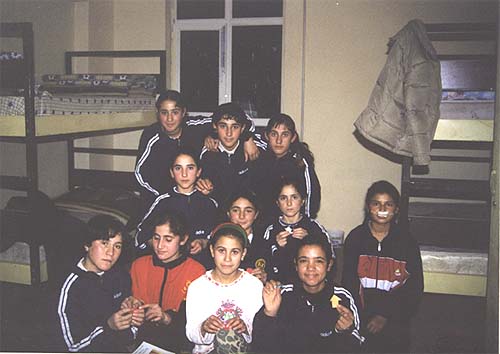 The entire population of female residents at 1071 Malazgirt PIO!
The entire population of female residents at 1071 Malazgirt PIO!
Sorry guys, that evening I didn’t hesitate too long before organising a segregated activity: “Origami for girls only”. While folding our frogs, we talked of air and water, school, hopes, families and relatives… How many brothers and sisters did they have? 9, 13, etc! I asked who had the fewest: “only 5” (but she then added that her mother was pregnant). And who had the most? “My mother has given birth 23 times ( I try not to gasp in amazement) but – she adds – only 19 are alive!” Does that make things better? Even less hesitation this time: Had they heard of family planning? I told them that if they only wished to give birth 19 times, there was no need for the extra 4 births… Back in Ankara, a friend of mine commented that not even a cow would be expected to produce so many offspring. Every year, every month these girls have in education gives a little more strength and hope for the future, a little less chance of the 16 th or 23 rd child appearing without need.
Yeliz the star of Bulanik Merkez YIBO asked me to give her my address; I told her I should be asking for her autograph ! She has amazing potential and must get to go to konservatuar. Has anyone got any contacts? 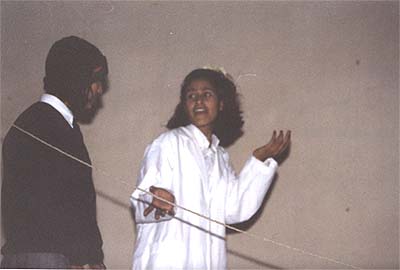 Our Yeliz in full action. Not the best of photos, but I had to include her.
Our Yeliz in full action. Not the best of photos, but I had to include her.
Yeliz is another example of a late starter, one of the girls who nearly didn’t get into education. She is now in 6.class, and not only acts very convincingly and sings beautifully, but writes scripts, and has organised her class mates into a theatre group – all this without any encouragement or assistance from staff! Coming soon to a theatre near you! I hope…
Curriculum extras: when in such regions, the gap between theoretical level of provision (the level of education that is in fact given in richer parts of the country) and what is in fact needed becomes apparent. Many of the children need support in basic concepts, skills and activities that are normally learnt within the family before school age.
Health. Some of the students need to be taught about hygiene, and perhaps even how to use a bathroom. Such aspects are not picked up in the home due to over-crowding, and absence of bathrooms. Under such conditions, a teacher may thus have to take on some of the duties of a parent. Much patience is needed to correct years of inappropriate habits; simply stating rules may not be enough to convince the pupils of the need for changing their habits.
Language: In Erentepe, I talked to a 1.year class teacher, an experienced teacher from Istanbul, now doing his military service. On his first day, he went into his class to find not one of his pupils could speak Turkish. I was aware of the sensitivity of the subject, and of the fact that we were there not on our own behalf, but representing ODTÜ and therefore in a certain sense in an official position, so I said little but thought a lot…
Some thoughts:
The vast majority of children attending primary school in Mus do not have Turkish as their mother tongue. Any teacher in this area should be prepared to teach Turkish… When I say ‘prepared’ I don’t just mean willing to try, but they should also be equipped with the skills necessary for teaching young learners a second language. Several teachers proudly demonstrated what they were able to do with their 1 st classes; each was individually attempting to discover their own methods. Such an approach is neither systematic not effective. Much classroom time will be lost through such trial and error. Furthermore this put a great burden on teachers, whose load is already heavy enough. In Milli Eğitim, some are willing to recognise the situation, though I am told the “situation is not right yet”. Ne zamana kadar beklemek gerekiyor?
Are prisons built not only for security but also to destroy souls?
In the unforgettable prison-become-school of Kümbet, I went into a 3.year class. The children were not very competent in Turkish, and any activities I could have planned beforehand would have failed (see the post-script at the end of this report). It took me nearly an hour to get in tune with the rather untogether class: was I getting really too tired to work effectively? Was it the lack of light struggling to seep through the bars of the windows near the ceiling? Or was there a lack of cohesion within the class? When I first entered one child spoke quite rudely to me, asserting his position as “head of the class”.
I remembered an incident many years ago in Britain in which a Pubjabi child got into trouble for not knowing how to talk to an adult; when the situation was analysed, it become clear that the child had never been exposed to formal interaction: she was speaking in the only form of English she knew: she spoke to everyone in the same way she would hear children addressing each other in the playground. I thus gave this child the benefit of the doubt… The next day, the child, Deniz, came up to me: Had I read his story? I’d not had time, but remembered well who he was. Could he talk to me? In private? Not a practical request when surrounded by so many ‘magnetic’ bodies! What he wanted was to apologise for his behaviour… I have never seen a child so earnestly apologise, and without anyone telling him to do so: I had said nothing in words, but he had obviously been able to read my body language. That moment was worth the trip: to see how a young person saw, understood, and took a decision to act. He did not miss this opportunity to change his life. This is an example of what I feel is worth doing with the children: for them to understand values, and the importance of skills and knowledge. They cn get data and facts from books, etc. but the opportunity for varied social interaction is something we can provide.
One hour passed, talking about a variety of subjects, not getting deeply into anything satisfying: as if I was just not able to work out where they were, and what they were interested in. Was I too foreign? That had been more of a stimulant than a problem in previous classes.
With only a few minutes left before dinner, just to fill time, I found myself getting some of my ‘minibooks‘ out of my bag. These were all little stories written for me by other children in Turkey, some for learning English, others recounting their experiences of the 1999 earthquake, or simply wild imagination. I read a couple to the class, and the devil inside me made me ask whether they thought they could write some too… I could have kept quiet and had a peaceful passive evening. But having promised, I couldn’t let them down. With the class teacher at my side as a ‘translator’ and assistant, I went back after dinner for a 90 minute session… 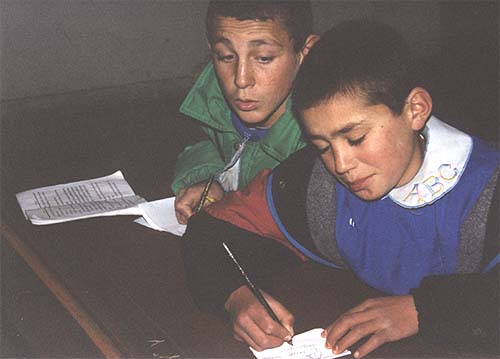 Two of my Kümbet youn writers, rising to the challenge: Deniz and … a hearing impaired child, sitting at the back of the class.
Two of my Kümbet youn writers, rising to the challenge: Deniz and … a hearing impaired child, sitting at the back of the class.
Was I running low on energy, or was something missing in this class? No comment! But after a battle to form a bond with this group, I decided this was perhaps the group I had been waiting for to apply my ‘minibook’ writing under adverse conditions: a teacher with low hopes for her pupils, a group of children whose Turkish I had problems understanding, and all this in a barely adapted prison ‘cell’ (What is the English for ‘koğuş ‘, ie a prison cell for 15 to 20 inmates ?)
Mini-books
Every session starts by sharing some examples: we read aloud stories written by other children. This sets the stage: the children can see what is involve: some paper folding, some drawing and a bit of writing. Before I hand out any paper, we talk about books and stories: what is in a story? A hero – who must be introduced, an event, and an ending – always a happy one! We then look at the origami part: the folding of the mini-book; at this stage a helper is essential. Then I usually let the children write whatever they want, only giving extra clues to those who don’t know how to start. I was later told ‘the children couldn’t do what you wanted’ but my purpose was free production, so anything was acceptable – and I got some amazing writing, some funny, some carefully thought, some struggling to break through the patterns they had learnt, shattered by signs of a sad start to life. These precious souvenirs will serve to inspire more children in other schools and villages.
A few random points:
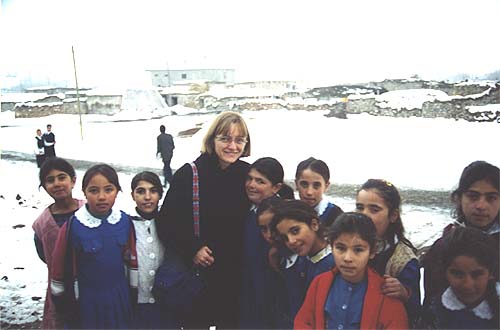 With 12 year old Zehra, a proud pupil in her first semester in education! Along with the inevitable curious extras that crowded into any photo.
With 12 year old Zehra, a proud pupil in her first semester in education! Along with the inevitable curious extras that crowded into any photo.
–A need for a network for supporting successful pupils ? I haven’t forgotten the story of a Kumbet pupil who managed to get into an Anadolu school in Bursa, and not being able to adapt to the conditons is now back home and ???still in therapy.
–Need to programme in some child-free periods to allow our team to relax; otherwise in September the team will soon wear out. I just about ran out of energy.
— No TRT ! What a relief. If the project wished to have a record of activities, a more cooperative and understanding technical team should be found.
—Protokol: not the most stimulating or relaxing part of the trip. But probably quite qorth while in terms of public relations, and keeping up the spirits of both soldiers and civil servants!
— Being a volunteer : attitudes… this is a long topic. I’ll not develop it here or else I’ll never finish this report.
— Special needs and children with disabilities: I noticed a partially sighted (albino) child and one with hearing impairement. Can they be getting better educational support? How much awareness is there of “özel egitim”, and the needs of certain children for adaptations?
Kalıcı English in under an hour: possible! Even 20 minutes. I’ll not write about this here as it would be too technical and will need a much longer report. It might even end up as a paper for a conference!
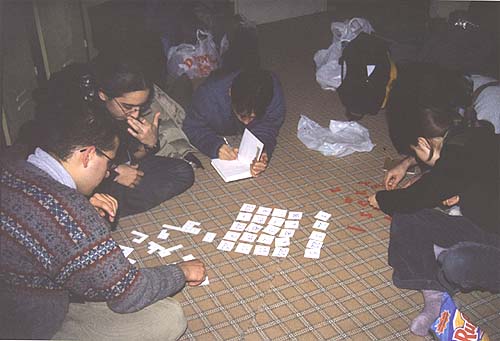 ODTÜ students hard at work: number puzzles…
ODTÜ students hard at work: number puzzles…
Maths activities: I wasn’t ready to do any maths in classrooms, having neither sufficient materials nor the rationale for explaining the activities to a Turkish audience; But I had several activities with me, and tried them with our own team, and with teachers in Kumbet. There I was able to leave one basic activity with some of the teachers for them to use with their pupils: for multiplication table . Since then several of us have been meeting to develop a set of activities in a form suitable for classroom, or even better for children to use independently in ‘etüd’.
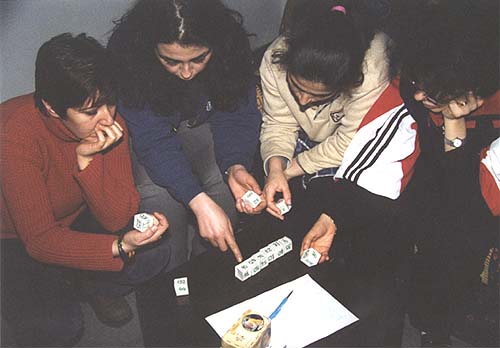 Kümbet teachers puzzling out a multiplication activity.
Kümbet teachers puzzling out a multiplication activity.
Dağıtım – Distribution : having seen many distribution events after the 1999 earthquakes, I can say this event in Besçatak was very successful. Having first got the shoe sizes of all the children registered at the school, we minimised incidents in which outsiders attempted to push in and claim free goods! Some confusion occurred at the beginning due to lack of language: soon solved when a couple of the older boys joined out ‘fitting team’ as translators. The only point that could be changed for next time is avoiding keeping the children waiting in line for such a long time, especially in cold weather
However some of us did wonder about the idea of being involved in the blood feud, or kan davası.
One of the films we watched on the bus going out was about a kandavası, showing the effect on both families, in the long term. As shown in the film, we were outsiders who drop in and then leave, without significant awareness of the situation, either in the past, or in the present; the teachers there are more close to the situation, and they are already involved. How valid is this symbolic activity, and are we (especially a group with no senior members of the ODTÜ staff) the best ‘official’ body to do this?. Perhaps our shoe distribution could/should have been more neutral.
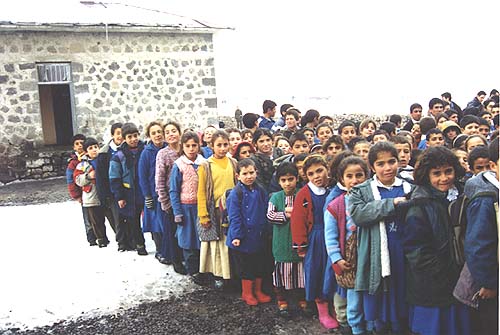 Lining up for shoes
Lining up for shoes
Our last good bye… 
A Couple of Questions:
Question : How do you find an ODTÜ student in Kümbet? (I was also identified as a student by not only the kaymakam, but also the albay: the written proof was the place-name label that night at dinner: “Claire Özel Ogrenci”)
Answer: Look for a large mass of tightly packed children moving slowly – all of them facing inwards – down one of those cold echoing corridors; somewhere buried in the centre you will find a squashed exhausted body, running purely on adrenalin…
This special “Magnetic” effect observed particularly in Kümbet might be an interesting subject for original research for a higher degree!
Question: Where do you find Fidel and Saddam and Kaddafi in one place?
Answer: In Kümbet! Does this say anything about parental opinions? And how will such names inflence the life options of these young people? Should parents be required to give their children some choice in the name they will have to carry through military service, job applications, and marriage? Post-script: something for us to think about…
Learner (child) centred or teacher/subject centred activities? I’m referring here to the approach I have seen on a previous İlkYar tour. On this Muş trip, we were a more anarchic gang, without organised activities to be conducted. We just went in to a class and improvised: responding according to our own interests and abilities, to the interests and conceptual levels of the children. On my previous tour, I had felt what we were being sent into classes to deliver a previously decided package of information: something that was perhaps NOT what the children were ready for or capable of receiving. Not being teachers of those classes, and most of us not being trained in primary or secondary education teaching, we are perhaps not best able to estimate the children’s levels. It may be worthwhile İlkYar members reflecting on this matter.
February 2001

